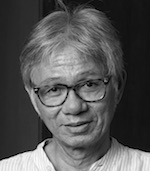
Few phrases pack a load as heavy and as serious as the one used as a theme title for a forum I have just attended: Saving the democratic institutions. It carries the whole burden of freedom, social justice, nationalism, and populism and the rule of the majority – why, it carries the whole burden of democracy itself! Now, how does one even begin to imagine what effort might be required to save all that?
The more basic and practical questions, I think, are these: What democratic institutions are we really talking about? Did these institutions get erected at all? It seems to me that they have been in fact defying construction; that they have been coming apart even before they could be put together, coming undone before they could get done. In other words, it seems we simply haven't done a good job of it at all; haven’t even begun to reform our still widely feudal culture in order that freedom and equality may take root and flourish in it.
Meanwhile, Rodrigo Duterte, the messiah of deliverance by extrajudicial shortcuts, has happened to us, overtaken us. By force of authoritarian character, he has co-opted or cowed or otherwise neutralized the forces capable of holding him in check – the very forces that, properly nurtured, would have developed into democratic institutions.
Duterte commands a ridiculous majority in Congress. He has a virtually absolute domination of the House of Representatives and an equally firm hold on the Senate. Some of his senators do switch sides on certain issues at certain times, but only for show; they do so only when switching doesn’t really make a difference in the vote, yet the occasion offers an opportunity for them to give an impression of some semblance of independent-mindedness.
The Supreme Court, for its part, betrays a leaning toward him in recent politically relevant decisions. Two are particularly noteworthy: one has acquitted former president Gloria Arroyo of plunder, the other has allowed a hero’s burial for dictator Ferdinand Marcos.
Arroyo had the good fortune to serve as president for 10 years, stepping up from vice president to succeed an impeached predecessor and serving the remaining 4 years of his term, then getting herself elected to the presidency on her own. Her unusually long reign allowed her to fill the Supreme Court with enough justices to compose a majority she could count on when the time came for her to face the court as an accused herself.
Duterte’s own good fortune lies in his political alliance with Arroyo, now a member of the House. And the Court’s decision to effectively declare Marcos a hero must have given Duterte a sense of validation in his professed idolatry of Marcos as well as in his anointment of Marcos’ son as his own heir.

Beyond narcissism
The cases of Arroyo and the Marcoses are themselves proof that no democratic institutions exist. Otherwise, Arroyo would not have been able to keep the presidency on a rigged vote even after that crime had been established by a taped conversation between her and an election commissioner – didn’t she, in fact, offer an apology on national television? An apology that was all it took for the nation to forgive her for subverting its own vote!
As for the Marcoses, they would not have been able to return unbothered a mere 6 years after they had been shooed off to foreign exile, get back into the social and political swing of things, and even bury their patriarch a hero.
To be sure, recent times have seen certain groups outside the government lead and inspire a mass rising by street vigil that, by sheer force of numbers and moral ascendancy, works as a potent counterforce. The Catholic Church and the cause-oriented groups that form what we now refer to as civil society made up its core.
But, its own vulnerabilities (money corruption, sexual transgressions) publicly exploited by Duterte, the Church has become timid, thus unable to provide the moral leadership and reinforcement civil society expects from it. Civil society seems in fact to have retreated from the streets and into cyberspace, operating mostly individually, but even there it is drowned out by the unrestrained savagery of Duterte’s hordes of nameless and faceless assassins.
A catalyst force in past freedom and rights fights, the traditional news media themselves are now divided into the intimidated, the charmed, and the overcautiously critical. It would be consoling hope that, thus divided, they cancel out one another’s potency; but, with Duterte’s social media troops in cyberspace, the battle for civility is lost to perversity and the battle for truth to fakery.
Surely, Duterte’s confidence does not come only from his narcissism. He knows that no democratic institutions can stop him; he knows that none of them exist. He knew it when he practically surrendered our territorial waters in the South China Sea to China. He knew it when he let his police loose on drug dealers and users in what now, with thousands dead, appears an indiscriminate and brutal campaign. He knew it when he sent his army to Marawi and his airmen up in the sky to drop bombs on that little provincial city. He knew it when he declared martial law for all of Mindanao upon his arbitrary determination that he was up against not just Abu Sayyaf outlaws and rebel renegades, but also ISIS terrorists.
And doubtless he knows it when he threatens he might just put the whole country under martial law.
Save the democratic institutions? If there’s anyone who needs saving – and needs saving now – it’s us, and if there’s anyone who can save us it’s us, not any of our democratic institutions. – Rappler.com